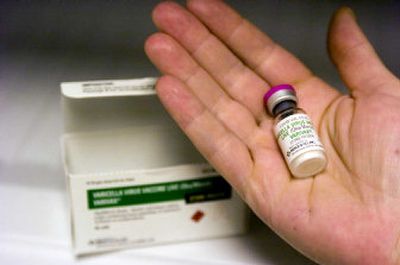Washington mandates chicken pox vaccinations

Marc Walker’s boys won’t add chicken pox shots to their back-to-school routine – but only because they’ve already suffered through the itchy childhood illness.
Otherwise, the Spokane father of three said he would wholeheartedly support Washington’s new rule that requires vaccination against chicken pox for kids entering school and day care.
“I would have welcomed immunization at the school level,” said Walker, 33, whose children each contracted the virus at day care. “I applaud it and am shamed as well, for we are the last to adopt this policy.”
Until this month, Washington was among a handful of states nationwide that didn’t require the varicella vaccine for school and day care. Now only Idaho, Montana, Wyoming and Vermont remain free of any mandates, according to the Immunization Action Coalition, a national advocacy group.
Spokane public health officials expressed relief at the new rule.
“We’re seeing (chicken pox) now in older kids and young adults and the rates of complication shoot up,” said Dr. Kim Thorburn, health officer for the Spokane Regional Health District. “It’s not a disease to be sneezed at.”
Although most cases of chicken pox are mild, possible problems can range from skin infections and pneumonia to sometimes fatal brain swelling, experts said.
The possibility of severe illness, even death, prompted widespread use of the varicella vaccine starting more than a decade ago. Before the vaccine was licensed in 1995, 4 million cases of chicken pox each year caused about 13,500 hospitalizations and 150 deaths, according to the national Centers for Disease Control and Prevention. Since then, the figures have declined by about 75 percent.
Still, national and local health officials have had a hard time convincing many parents – and even some doctors – that chicken pox is anything but a childhood rite of passage.
One Spokane father has been seeking out playmates with chicken pox, the better to infect his 4-year-old son. Dan Tylman said his pediatrician recommended it.
“Why not try and get the natural immunity?” said Tylman, 39. “We have definitely had him immunized against everything else, but the research on this seems to show the natural immunity is best.”
If Theo Tylman doesn’t come down with chicken pox before kindergarten next year, his parents will get him the shot. Dan Tylman said they’re not interested in joining the ranks of Washington parents who exempt their kids from immunization requirements.
“I’m not in the anti-vaccine camp, but I’m certainly wary,” he said. “Nothing is without risks, and we have a number of MDs in my family, so I’m fully aware of the risks with vaccines. But we’ve weighed the risks and we’re willing to have our child vaccinated.”
Still, the new chicken pox mandate spotlights the fact that the Tylmans have more choices in Washington, where exemption policies are among the most lenient in the nation. The state is among about 20 that allow exemptions not only for medical and religious objections, but also for personal or philosophical reasons.
Statewide, some 43,600 children in grades kindergarten through 12 were exempt from vaccinations in 2004, according to the most recent figures available from the state Department of Health. That’s about 4.2 percent of the more than 1 million kids enrolled in school, far higher than the 1 percent of kids exempted nationwide.
Nearly all – 90 percent – are like Mary Murphy of Spokane, whose children are grown, who said she always took advantage of Washington’s philosophical exemption.
“I do not trust immunizations,” said Murphy. “None of them have ever missed a day of school for a childhood illness for which an immunization was available. There is something about a process that is so unquestioned while it yields a fortune for pharmaceutical companies that just can’t earn my trust.”
Across Eastern Washington, the percentage of people who agree – and disagree – with Murphy varies widely. This region posts the state’s highest and lowest exemption figures, state records showed.
In Spokane, about 5.4 percent of the county’s nearly 80,000 school kids were exempt from vaccinations in 2004. In Adams County, less than 1 percent of the nearly 4,000 students were exempt.
And in Ferry County, 15 percent of schoolchildren were excused from immunization, followed closely by nearly 13 percent of students in Stevens County and nearly 9 percent in Pend Oreille County.
Levels that high worry state officials, who fear that community immunity to illnesses ranging from measles to whooping cough will be compromised by widespread exemptions.
“We need high levels of vaccination to prevent disease,” said Michelle Perrin, health promotion manager for the state immunization program. “One or two parents won’t matter, but what if many parents want to exempt themselves?”
That question also concerns Yvonne Bicchieri, community health director for the Northeast Tri-County Health District, serving the region with the highest exemptions.
“That’s a problem,” said Bicchieri. “That’s definitely a problem.”
She’s not sure why exemptions in her area are so extreme. It could be that the population is fairly mobile, so immunization records are less likely to be complete, she said. People also tend to get vaccinations more often from private doctors than from the public health agency, she added.
“I’m hard-pressed to speculate too much on that,” Bicchieri said.
But in Adams County, longtime school nurse Nancy Miller knows exactly why exemptions there are so low.
“They just do what Nurse Nancy says,” she said. “The biggest problem I have is kids coming from other states. I just say they can’t come to school unless they have that shot. They get it the next day.”
Miller, who has spent 20 years serving Washtucna schools, said some districts might allow parents to exempt themselves because signing a form is more convenient than looking up vaccination records.
“We don’t even say it’s an option,” she said. “And it doesn’t even occur to them.”